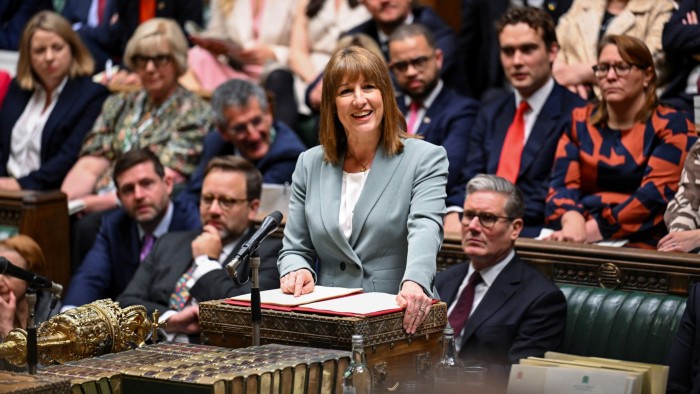Unlock the Editor’s Digest for free
Roula Khalaf, Editor of the FT, selects her favourite stories in this weekly newsletter.
Chancellor Rachel Reeves will next week give more details of a £113bn capital spending spree with a 10-year infrastructure plan intended to boost growth in Labour’s heartlands, as ministers geared up for a fight with the party’s backbenchers over welfare cuts.
The chancellor’s allies say her spending review this week — which combined a squeeze on day-to-day spending with a big increase in capital investments — aimed to create a political platform for Labour at the next election.
Reeves has told Labour MPs to “go out and sell” the extra cash going to projects in regions including the north and midlands, as Labour’s high command attempts to halt the rise of Reform UK in working class areas.
While the package was generally well received by Labour MPs, Reeves is facing a fight with her colleagues on a different front, as mutiny builds over plans for £5bn of benefit cuts by 2030.
The chancellor hopes the goodwill engendered by the spending review will smooth the passage of the welfare reform bill, which will be introduced next week; any significant retreat would blow another hole in fragile public finances.
“We’ve given MPs a product to deliver on the doorstep,” said one ally of Reeves, referring to the rolling programme of capital spending being deployed to towns and cities across the country.
“The point was to have a coherent argument of what the economic strategy is — investment versus decline — but it was also a very political speech.”
Reeves’ spending review was heavily criticised by Paul Johnson, the outgoing head of the Institute for Fiscal Studies, who claimed she had used “baffling” data and was within a “gnat’s whisker” of breaking her fiscal rules and requiring more tax rises.
But one colleagues of Reeves said: “The fact that Paul Johnson didn’t like it but Labour MPs did means that we succeeded in our job.” One Labour MP said: “It felt like a reset.” Another MP said: “She played a bad hand well.”
However dozens of Labour MPs are less happy about benefit cuts, with party whips trying to contain a rebellion over the welfare reform bill, which will be tabled next week before getting its crucial second reading in early July.
Work and pensions secretary Liz Kendall has offered an “olive branch” to rebels by promising to write into law some of the proposals contained in a consultation paper to soften the blow on individuals, according to allies of Kendall.
Under current plans, more than 370,000 people who currently claim disability payments known as “personal independence payments” will lose the benefit, but Kendall will guarantee they will continue to receive them for 13 weeks to help their transition into work.
Kendall will also write into the legislation a commitment that benefit recipients with fewer than 12 months to live or with progressive and incurable conditions would automatically receive a higher rate of universal credit, without having to be reassessed.
However Kendall’s allies insist these are “not concessions”, but are instead legal guarantees of proposals that are already under consultation. They argue that the substance of the package remain the same.
A Labour rebellion still seems inevitable and the SNP’s Kirsty Blackman, in a letter to prime minister Sir Keir Starmer, denounced what she called a “squalid” attempt to quell a mutiny and “an insult to disabled people”.
But Reeves is determined to stick to the £5bn cuts programme, knowing that a retreat would leave her politically weakened and would further dent her fiscal programme. This week she performed a £1.25bn U-turn over her winter fuel policy.
The chancellor was in Wales on Friday, promoting a plan to spend £445mn on Welsh railways and £118mn on coal tips, although opponents in Wales said the country was being short-changed by the chancellor.
Reeves’ allies joke that within hours of her announcing the spending review — which allocated cash to Whitehall departments for the next three or four years — ministers were demanding a bigger share of the ten-year infrastructure plan.
Meanwhile Kemi Badenoch, Conservative leader, told Scottish Tories that she would scrap the windfall tax on the North Sea energy sector, which her government introduced and which raised £3.6bn in 2023-24. Labour officials say the energy profits levy is highly popular with voters.
While calling for lower taxes, Badenoch also criticised Reeves for not using her spending review to show how she would raise billions of pounds extra to meet a commitment for Britain to spend 3.5 per cent of its GDP on defence in the next parliament.




